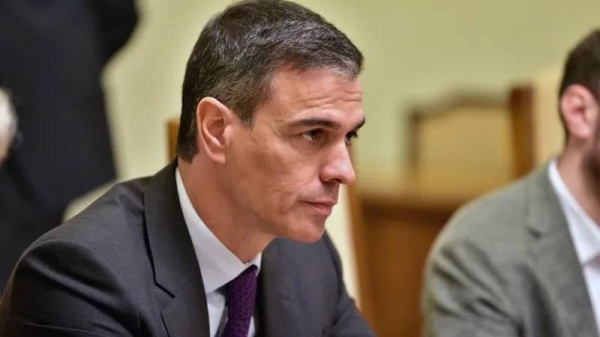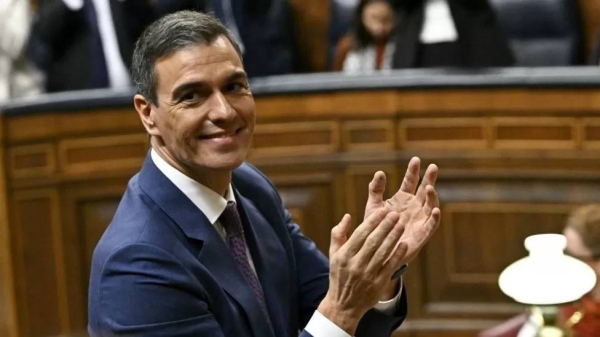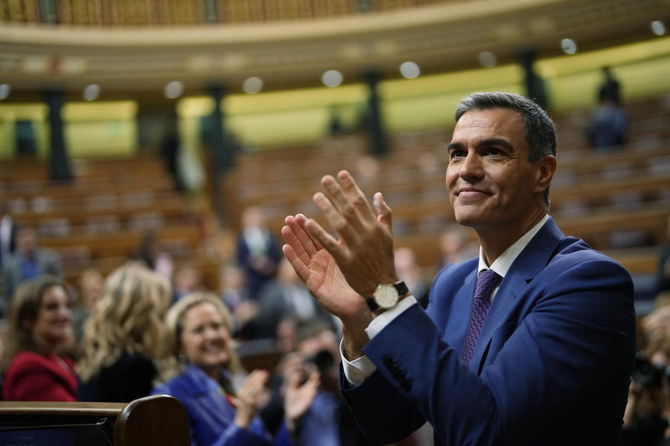
Pedro Sánchez has built a reputation as a successful political gambler, but suspending public duties and threatening to resign, as he did last week, was a political bombshell. It was so extraordinary it led to five days of national puzzlement and the wildest speculation over his motives: from mental health to true love and all kinds of shenanigans associated with the dark arts of politics in between. His announcement that he would not, after all, be resigning, came as another surprise, even to some of his political allies.
The timing of this apparently self-inflicted political turmoil adds to its oddity. The centre-left socialist prime minister spent months putting together a fragile parliamentary majority after a close election in July 2023. His coalition government is now on the verge of passing a contentious amnesty law for Catalan officials involved in the unauthorised vote on Catalonia’s independence in 2017, and his Spanish Socialist Workers’ party (PSOE) is leading the polls ahead of a momentous regional election in Catalonia on 12 May.
In announcing that he needed time to consider his future, Sánchez cited a “harassment and bullying operation” being waged by his opponents against his wife, Begoña Gómez. This came hours after a judge opened a preliminary investigation into allegations of a conflict of interest relating to university programmes Gómez led and a company that received pandemic recovery funds.
The court case was initiated by the pressure group Manos Limpias (Clean Hands), which has links to the far right. Sánchez rejected the allegations against his wife as untrue and blamed right wing political opponents, but also reporting by “overtly rightwing and far right” media, without specifying which outlets he meant.
On Monday, after his period of reflection, Sanchez issued another statement, vowing to stay on and fight even harder against those who peddled the “falsehoods distorting political life”.
Sanchez is right to call out unprofessional media organisations for spreading lies and baseless insinuations. He has long had to contend with personal attacks and absurdities spread online by his right wing and far-right opponents, including malicious and unsubstantiated rumours about his wife and her family.
But he is unfairly conflating scurrilous online gossip and rumour disseminated by minor outlets and fringe pundits with legitimate reporting by major news organisations raising questions about ethical standards in government.
Beyond Gómez’s case, which appears to be a minor issue, more serious allegations face the Sánchez government. A former minister, José Luis Ábalos was suspended by the PSOE in February after refusing to resign over an alleged bribery scandal involving a departmental assistant. Ábalos was not himself investigated and denies any wrongdoing, but the party said he bore “political responsibility”.
Sánchez has a point about the degradation of debate in Spain’s parliament, in the media and in public institutions more broadly. Levels of what political scientists call “affective polarisation” (the extent to which the different political camps detest each other) in Spain are worse even than those in the US, recent studies suggest. Even if ideological polarisation is itself not extreme when you look at issues such as inequality, redistribution and the climate crisis, where there is still consensus, hatred of rival parties is increasingly an issue.
It is very easy to point to politicians’ crude rhetoric, particularly on the right, as a cause. The prime minister is routinely accused of “lying” without proof. Opposition conservatives describe Spain as a “dictatorship” with Sánchez behaving like Franco. There are no consequences as there is no ministerial code against lying or accusing someone of lying. There have even been a few incidents of physical violence against local socialist officials.
Sánchez characterises such attacks as “asymmetrical,” noting accurately that the strongest vitriol comes from the right. But he’s not blameless in fuelling or accommodating division. It may not be his personal style, but his minister for transport, a key figure in the party, is well known for his robust treatment of journalists and politicians on social media and beyond. Some might call it bullying. In the past few days, government ministers and allies have accused their rivals on the right of nothing less than attempting a coup d’état and paint the current situation as a struggle between good and evil.
Going on the attack has become a successful media strategy for many Spanish politicians and often provides a convenient distraction from political scrutiny. The conservative president of the Madrid region, Isabel Díaz Ayuso, came in for widespread criticism following her team’s aggressive response to media that reported an investigation by tax authoritites into alleged fraud by her partner. Diaz Ayuso accused the government and media of orchestrating a campaign to target her via her partner.
The irony is that Spain is now in good shape. The country has a resilient economy boosted by migration, efficient trains and public services that work reasonably well, a booming renewables industry and lively, walkable cities.
Perhaps it should not come as a surprise that Spaniards point to politicians as the country’s main problem. In the latest poll from the public polling centre, with data from March, the issue most frequently identified as the country’s biggest problem is “the government and the political parties”. “Bad behaviour of politicians” is mentioned almost as often. The percentage of Spaniards who trust news most of the time has fallen 18 points since 2017, according to the Reuters Institute for the Study of Journalism.
Suggesting that Spanish democracy is in danger may be an exaggeration if you consider that not so long ago politicians, civil servants and journalists were being killed by the terrorist group Eta for doing their jobs. But institutions that were not that strong to begin with are being eroded by Trumpian rhetoric.
There are no independent public inquiries in parliament. Judges often display partisan inclinations, and judges of the highest legal authority are appointed by political parties. There are no impartiality rules for journalists working at the public broadcaster, where governments and political parties constantly interfere. Standards are nonexistent across almost every sphere of public life.
Even if no rules were broken by the prime minister’s wife, Spain lacks an effective ethics watchdog to prevent impropriety, as Miriam González, a Spanish lawyer who is married to Nick Clegg, has pointed out. This seems like a basic requirement in a functioning democracy.
It would be welcome if this crisis proved to be a turning point for standards in public life. Sánchez asked for “a collective reflection” for “regeneration”, but fell short of offering a nonpartisan agreement or reforms. The absence of rules in parliament and the disregard for basic norms have polluted public life in dangerous ways in the past decade. The most radical parties have not been able to capitalise on this as they have in other countries, but Spanish politicians are playing with fire.
María Ramírez is a journalist and deputy managing editor of elDiario.es, a news outlet in Spain












